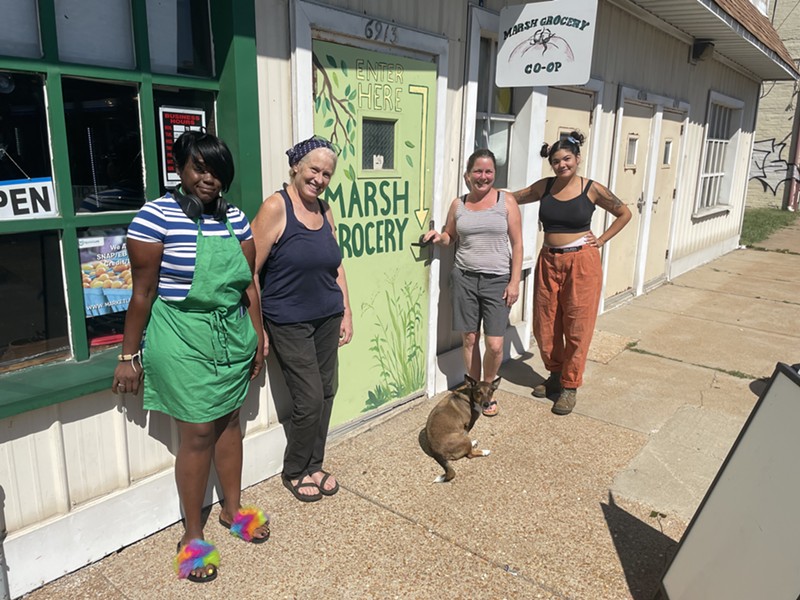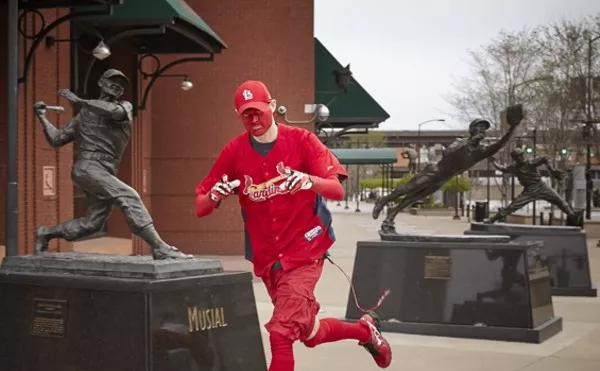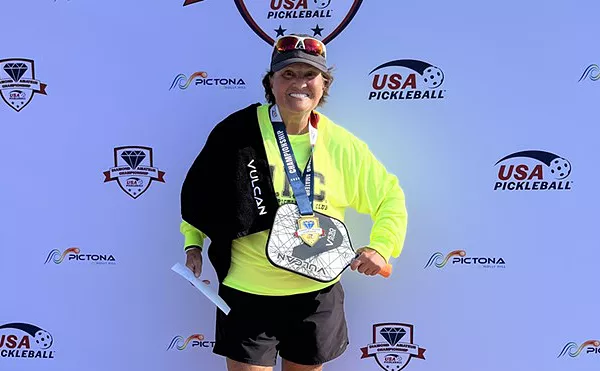
BENJAMIN SIMON
(Left to right) Ranata Frank, Beth Neff, Chrissy Kirchhoefer and Grace Smith stand in front of MARSH grocery store in the Carondelet neighborhood.
When MARSH opened in the summer of 2021, people streamed into the store. Shoppers. News cameras. Even the mayor. The store, says staffer Grace Smith, had a “buzz.”
That’s because MARSH, located at 6917 South Broadway in the Carondelet neighborhood, wasn’t like other grocery stores. Sure, it sold vegetables, baked goods, prepared foods, meat, dairy, herbs and more. But this wasn’t a Schnucks or a CVS.
MARSH is a co-op, where vegetables aren’t bought in bulk from a distributor –– they are grown in one of the business’ three city gardens. One person doesn’t run the store –– anyone who buys a share has a say in ownership decisions. Customers don’t pay a strict listed price –– they pay what they can afford. The goal is to provide a grocery store that serves the largely disinvested area with organic food at an affordable price.
“Our model is not-for-profit,” says staffer Beth Neff. “We're not pulling any profit for our own capitalization, and we're paying people high wages. By trying to reverse what we believe is sort of an extraction model, we're also putting ourselves in a precarious position. We’re trying to break molds that are not generative to a community.”
One year later, the experiment has produced mixed results, store owners say. Traffic has slowed. The store gave away nearly $13,000 worth of food through the pay-what-you-can system, which had to be modified (though Neff says this shows the "level of food insecurity" in the community). A grant from America’s Healthy Food Financing Initiative ran out, forcing the staff to shrink from 11 to 4 workers and forcing the store to shorten its opening hours.
“It takes a lot of time,” Neff says. “It takes time to sort of build a following. How do you change people's shopping patterns? You get home from work, you're hungry, you're gonna run to Schnucks.”
Neff knew there would be challenges. When Neff and her co-workers initially applied for the grant, they didn't predict breaking even until five years in the future.
"What are we supposed to do between years two and five?" she asks. "So that's where we are right now. What are the ways that you can build a sustainable business that is not extractive and exploitative? How do you do that? So now we're asking deeper philosophical questions."
On a weekday morning in September, MARSH, which stands for Materializing and Activating Radical Social Habitus, is quiet with few customers. Staffers are huddled around the stove, trying to prepare enchiladas for the week’s pre-made community-supported agriculture meal. The business has struggled, but that has not stopped the staff from keeping the grocery store alive.
“As difficult as it is for us to even be sustainable, we're trying to build something new that hasn’t been really done before,” Smith says.

BENJAMIN SIMON
Ranata Frank, Beth Neff, Chrissy Kirchhoefer and Grace Smith stand inside of MARSH, which has fresh produce from its own garden.
The concept for MARSH got its start when Neff purchased the building on Broadway in 2018. She intended to turn the space into a cooperative diner, but a flood wiped away those plans.
Then, in early 2020, the pandemic hit. With the help of her daughter, Neff created MARSH as an online co-op and a biweekly outdoor market. The organization also handed out nearly 100 bundles of free food to people in the neighborhood every week during quarantine.
While running the online shop, Neff realized the need for a brick-and-mortar grocery store in the community. Neff and her team applied for the Healthy Food Financing Initiative grant and by the summer of 2021, the store opened.
“We want to encourage access to natural foods,” Neff says, “which has been like an elite thing in the past –– only certain neighborhoods and certain people were able to access high-quality, nutrition-dense [organic] kinds of foods.”
One year in, parts of their design have worked well. The CSA, where customers pre-pay for a recurring box of food from the store, has “saved our butts,” Smith says. For the boxes, staff members prepare some items, such as the enchiladas. In the past, boxes have also included carrot raisin muffins, ham pies and egg rolls.
The staff wants to hire a kitchen coordinator, who would help ease the cooking workload for employees and allow them to gradually open a diner. They plan to host live music and a climate symposium in the future.
Neff and the team also made some adjustments. Most recently, they modified the pay-what-you-want policy. Now people mostly pay within a threshold –– either 20 percent more than the listed price or 20 percent less.
Most notably, the employees want to connect more with their neighbors. When they sent out a recent survey to the surrounding community, only 10 percent of residents said they knew of MARSH –– and that is a problem.
“I think that we have significant amounts of work to do to become a fixture of this neighborhood,” Neff says. “…There are lots and lots of other people that would be interested in knowing about this that just don't know about it. Our problem-solving needs to happen in a really grassroots sort of way.”
But, despite the ups and downs, the team says MARSH isn’t going anywhere.
“It definitely takes a commitment, and I think that's, in some ways, what we're asking for. What does it look like then to commit to change?” Neff asks. “And that's going to take a lot of time.”





